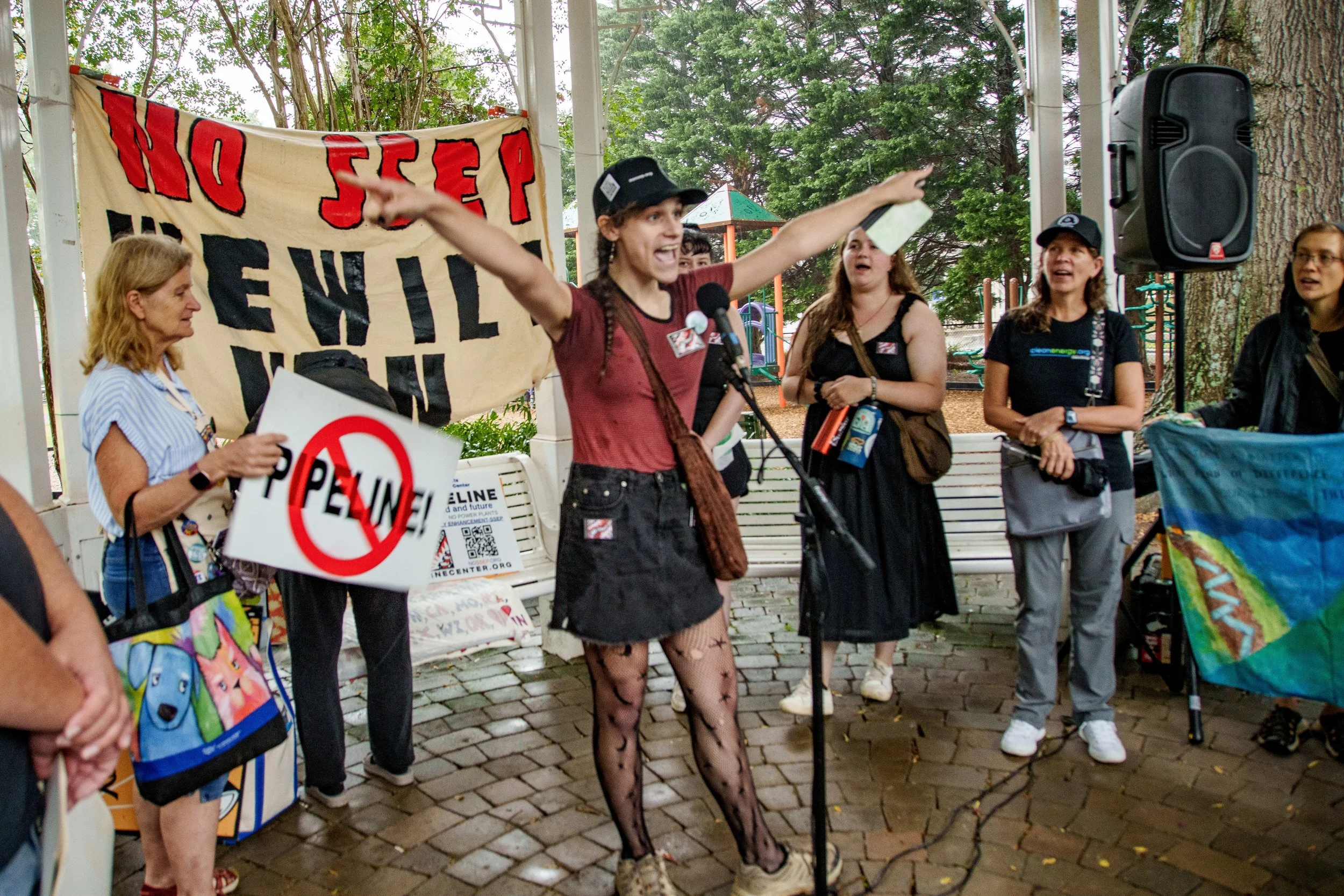In Rural North Carolina, Small Towns Take on Big Oil
This article was written as part of our 2025 Impact Report.
Dr. Crystal Cavalier-Keck traces her organization’s roots back to the day in 2018 when she learned that a proposed extension of the Mountain Valley Pipeline — a fracked gas project covering more than 300 miles — would cut across a local lacrosse field where she and her husband coached.
“That moment changed everything for us,” she said. “We just felt like we needed to do something.”
The pipeline extension would run through Dr. Cavalier-Keck's hometown and tribal grounds, the ancestral Occaneechi-Saponi lands, in the rural Piedmont region of North Carolina. It wasn't long before Dr. Cavalier-Keck and her husband, Jason Crazy Bear Tircuit Campos-Keck, were pouring all their energy into protecting their community from the threats it posed to their health, land, air, and water.
But they quickly learned that organizing against polluters comes with big risks. “We were getting threatening letters, people were following us, even hacking into our internet,” she recalls. That experience convinced them to found 7 Directions of Service, a nonprofit that would make it easier to protect themselves from harassment and give local communities a more coordinated way to fight back.
For the Kecks, this work is grounded in more than policy battles. “Our Indigenous values teach us that the land, the water, and the sky are our relatives,” Dr. Cavalier-Keck explains. “We care for them, and they care for us. That understanding guides every decision we make.” She also wants others to reconsider their relationship with the earth: “Everyone, everywhere, comes from people who knew how to listen to the land. We can all return to that.”
They joined forces with other Indigenous activists, working-class families, and farming communities in the path of the proposed pipeline. Thanks to their broad and sustained public pressure — bolstered by allied organizations like Appalachian Voices, Sierra Club, and Clean Water for North Carolina — seven years later the pipeline extension has not been built. But the fight is far from over.
As they push to make sure MVP Southgate is canceled for good, these frontline groups are also facing a slew of new polluting projects. At the top of the list is the massive Southeast Supply Enhancement Project (SSEP) — one of the largest gas pipelines proposed in a decade — which would force more polluting methane gas through Southern states already disproportionately burdened by dirty energy buildout. Construction is slated to start in about a year unless frontline communities can stop it.
While researching the plans for the project, 7 Directions of Service staff discovered that federal regulators were fast-tracking it with minimal environmental oversight, allowing it to proceed with a limited environmental assessment instead of requiring a more comprehensive environmental impact statement.
“The people making these decisions are appointed by allies of polluting industries,” Dr. Cavalier-Keck explains. “They’re not going to acknowledge the real risks to the people that live here, so we had to get creative and find other ways to show what’s at stake.”
They went town by town, county by county, talking to residents in the pipeline’s path about what it would mean for their neighborhoods. “We’re lucky to have some amazing organizers — like my colleagues Claire and Aiden — who have been going to town halls and community meetings, talking to people regularly for months, getting to know them, earning their trust, and helping them understand the safety concerns," Dr. Cavalier-Keck explains.
Organizers and community members at a rally in Kernersville, NC against the Southeast Supply Enhancement Project pipeline.
Through educational programming, cultural initiatives, and civic engagement, they taught Black, Brown, and Indigenous communities how to push back against extractive industries that exploit their land and resources while pumping pollutants into their soil, air, and water.
“Many people feel like they have no say,” Dr. Cavalier-Keck says. “We’re conditioned to believe that if the government or a corporation wants something, they’ll take it and there’s nothing you can do. But people deserve to have a say in what comes into our communities.”
7 Directions of Service has learned to be nimble as they communicate with North Carolina’s diverse rural communities, tailoring their approach to what matters most to local residents. "In some places, it's about land rights," she notes. "In others, we focus on health impacts, especially for families with children or elderly relatives. We meet people where their concerns are."
They also combat misinformation and fossil fuel industry talking points — especially false promises about jobs and economic benefits. "Pipeline companies say they'll bring jobs, but the truth is those jobs go to outside contractors who already work for the industry," Dr. Cavalier-Keck explains. "There may be a handful of short-term jobs in security or flagging — but once construction is over, the community is left with nothing but the risks."
Slowly, residents who once believed resistance was futile began showing up at council meetings, speaking out, and demanding accountability. And that growing public opposition has forced local elected officials to pay attention.
In May, the rural town of Midway became the first municipality in the proposed pipeline’s path to pass a resolution opposing it, citing concerns about air and water contamination and other dangers to local residents.
A month later, a 30-minute drive west in Guilford County, dozens of community members packed the Old County Courthouse, holding signs that read “SSEP: NO BENEFITS. ONLY RISKS!” Amid their calls and testimony, Guilford commissioners unanimously passed a bipartisan resolution similar to Midway’s, calling for a more thorough analysis of the project’s potential dangers.
Protestors called on county commissioners to oppose the Southeast Supply Enhancement Project pipeline at a public hearing in Forsyth County.
Most recently, sustained grassroots pressure in Forsyth County prompted commissioners there to unanimously pass a bipartisan resolution opposing SSEP as well. They’re demanding that the state’s department of environmental quality reject the water and air permits required for construction to begin, and that federal regulators rigorously evaluate the pipeline’s risks.
These advocates know they still have a long road ahead of them. Local resolutions alone won't block a pipeline from being built. But together, communities are creating political pressure that makes these projects harder and more expensive to complete. Ahead of critical permitting decisions, organizers are confident that the growing calls from those on the frontlines will be impossible for regulators to ignore.
For Dr. Cavalier-Keck, each win isn’t just about blocking one project — it’s about fundamentally shifting how people see their power and their connection to the world around them.
“It takes courage for people to say ‘No, we won’t allow this to happen,’” she says. “These polluters assume that rural communities like ours lack the power to stop them. We’ve shown them they’re wrong. The people who call this place home deserve to decide what happens here. We're the ones who will pay the price.”


